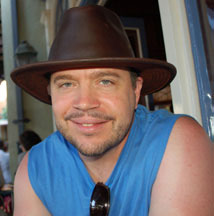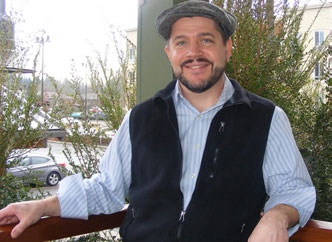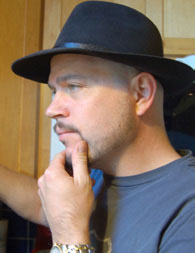Featured Musician - January 2014

Dan Gildea
Name: Dan Gildea
Instrument: guitar
Early Years/Education: Grew up in the McKenzie River Valley in a small town called Vida, Oregon, which is 45 miles NE of Eugene. Dad is an attorney, and he commuted to Eugene everyday. So we lived on a big piece of property. I have eight brothers and sisters, including a twin sister. Dad had a big Hammond organ in the living room. He played sax and clarinet, that’s how he got through college, playing in bands. He could also play organ. He’d have me on one leg and my sister on another leg, and he’d play Americana ... Irish folk songs. Dad loved jazz, but not a lot of jazz was heard in the house, just singing. Older brothers were into disco since it was the ‘70s.
My oldest brother was into the Beatles, and he learned how to play guitar. He’d go off to college and learn new chords and come home and teach me on his guitar. Then, on my seventh or eighth birthday, I got my own guitar. To this day, my brother still plays guitar and sings, and he is great. His name is Spike Gildea, and he lives in Eugene.
My folks moved to Eugene so I could go to high school there. I went to South Eugene High School for one year, but the year I got there, Greg Hall left — he was the guy who had their music program rocking. [So, since] my friends all went to Churchill High in Eugene, so that’s where I ended up. My first rock band was called “Sticky Fingers.” We were a trio and started learning some jazz stuff and started taking lessons with guitarist Don Latarski. My friends were a bass player and a drummer. They are still playing music, and both live in New York. We’d go out and see bands, listen, and then go and jam at my Dad’s office space in Eugene. We all felt like playing music was part of our identity — it was what we did on a daily basis, so it wasn’t a far stretch to want to become a professional musician.
I went to Portland State when Charlie Gray was in his first year, and he got me into the program. He was a huge influence. Trumpeter Gary Barrone was also there teaching with Charlie while he was getting his Urban Studies degree. Gary took me under his wing ... turned me onto Coltrane, etc.
One of the most influential moments was when Gary took me over to Remo’s, and there was a jam session happening. I was scared, and he said, “These guys are great and you need to play with them and they need to know who you are.” So he took me in, and Ron Steen stands up. There’s a whole line of horn players wanting to play, and Ron says, “You guys just sit down, a friend of mine just walked in.” Gary whispers in Ron’s ear, and Ron says, “We’d like to invite a special guest, Dan Gildea, to play. Alright, it’s just going to be Dan, Leroy Vinnegar and me.”
It was so stressful, but it was really cool. I was 18. At the end of my solo, Leroy goes to take a solo and he quotes the last four bars of my solo at the beginning of his. It was just like someone walked over to me and put his arm around me. It was so re-affirming. I did two years at PSU, then moved down to Eugene and did two years at University of Oregon. During that time, I’d drive up to Portland to study with Dan Balmer.
New York: I had two close friends in New York, so I moved there and stayed for five years. I ended up getting my degree from the City College of New York in Harlem and studied with Ron Carter for two years. I was in his combo. He had a section called “rhythm combo,” where we’d play for three hours and he’d bring in guest soloists. It was a class where we learned how to comp underneath soloists. Part of the reason why I chose CCNY was when I looked at all the music schools in New York, like Manhattan, The New School, Mannes, for example, they all had the same adjunct professors, all the same guys! Because I was a resident of New York at that time, it cost under $2,000 a year to go there. Why pay for private tuition?

Dan Gildea
[So] I played around New York, and things were happening for me. I had moved there with my girlfriend, who got a job teaching in Brooklyn, but she really didn’t like it. [So] after five years, we moved back to Oregon. I was depressed when I came back home, even stopped playing. After a while I started playing again and got integrated back into the scene here, which was so different from what I was playing in New York, which was very modern. I was part of the downtown scene of which Dave Douglas and Kurt Rosenwinkle were part of. I played in similar groups with musicians who were part of that circle. They’d play exact bebop arrangements of old school tunes with electric guitars with heavily affected sounds.
Teaching: I’ve been an adjunct professor at PSU for 10 years. My philosophy of teaching now — I feel like I’m a mentor guiding the students through their discovery of jazz and discovery of who they are as improvisers. There’s the theory of it which is important, but you’ve got to go well beyond that, and that’s where the fun is.
The lessons I took with Dan Balmer were transforming. He’d assign four to five tunes for you to learn, know them well and be able to solo on them and see you the following week. It was my goal to play them well enough so he’d want to solo over my chords. If you didn’t play great, he’d stop you and say, “This chord is not right. I’m not going to tell you what to do, you are going to have to figure it out.”
Ron Carter’s teaching style was about tearing you down. If you did your job, he would not tear you down, but he’d never compliment you directly. John Abercrombie’s style was he’d pull up the theory and say, “This chord is derived from this, and if you are going to play anything over this, it should be derived from that.” He’d inform you of the different ways to create different sounds. Gene Bertoncini’s teaching style was kind of like Dan Balmer. He’d assign tunes, and I’d come and play. He’d have exercises for you to work on. I’d play a solo over a tune, and he’d say, “That was pretty good.” Then, he’d pull out a piece of tape and wrap three of my strings up, and then say, “Let’s see how you solo now without using those strings.” Then he’d say, “Don’t play below a certain fret” -- he’d throw curve balls at you. It forced me to know the fretboard.
Bands: Now I have my own trio with Bill Athens on bass and Charlie Doggett or Randy Rollofson on drums. I still play gigs with my brother in Eugene. We do house concerts that are usually packed. I also played for years with the Dave Fleschner Trio, in Ben Fowler’s quartet, and Mary Kadderly’s groups. I’m now doing duo gigs with Anandi. I’ve worked a lot as a sideman over the past 12 years. For the past 11 years, I’ve been a stayat- home dad, teaching and gigging at night. Now that both of my boys are in school, I have more time to play.
Musical Influences: Portland organist Benny Wilson, John Scofield, Pat Martino, Miles Davis, Earth, Wind & Fire, Louis Armstrong, my family, Dave Douglas, Art Blakey, Lewis Taylor and all my guitar teachers.

Dan Gildea
Most Satisfying Experience: There’s a musical place I get to … you know I’m in it cause my eyes are closed. Sometimes I don’t have to open my eyes for an entire set! It happens when everybody’s playing, and we’re all on the same page and playing the big “M” music. I’m not distracted by anything, the tone is perfect, everybody’s time is great, we’re speaking on a much higher level. Those are the moments when I get in my car to drive home, and it’s just utter joy. Playing with Ron Carter was a great musical moment. It was at school, but it was a gig, and he paid me. It was just wonderful to play with him.
Favorite Recordings: “Charlie Parker With Strings”; Miles Davis from the ‘50s, ‘60s and ‘70s; Charles Mingus “Ah Um”; Lewis Taylor (self titled); Dave Douglas “Tiny Bells Trio”; John Scofield — almost all; Stevie Wonder “Innervision”; Frank Sinatra — I can’t choose just one; Art Blakey ... Messengers “The Big Beat”; Pat Martino, “El Hombre.”
Discography: With Stephanie Schneiderman: “Unbelievably Broken,” “Touch Down,” “Live At Kung Fu Bakery,” and an EP, “Fall.” With Dave Fleschner: “Creepin’ Up,” “At Home” and “Deep Roots.” With Mary Kadderly: “Mary Kadderly and Nancy King,” “Christmas Memories,” “Lucky Me.”
Gigs: January 4 and March 1 w/Mary Kadderly, The Heathman Hotel; January 25, February 22, and March 22 w/Mary Kadderley, West Cafe, 6-9 pm. Future gigs on the website dangildea.com
Future Plans: I have original music I want to perform and record. I’m working on projects with Jeff Langston, a bass player who just moved back here from New York. We’re taking iconic records and re-creating them, like an entire Nirvana disc. We take that music and reharmonize it and turn it into something softer. We’re taking popular music and making it instrumental, which is what jazz musicians used to do.
Other: I love turning a club gig into a concert; the people get sucked in, [and] you have them for an entire evening.
-- by Rita Rega